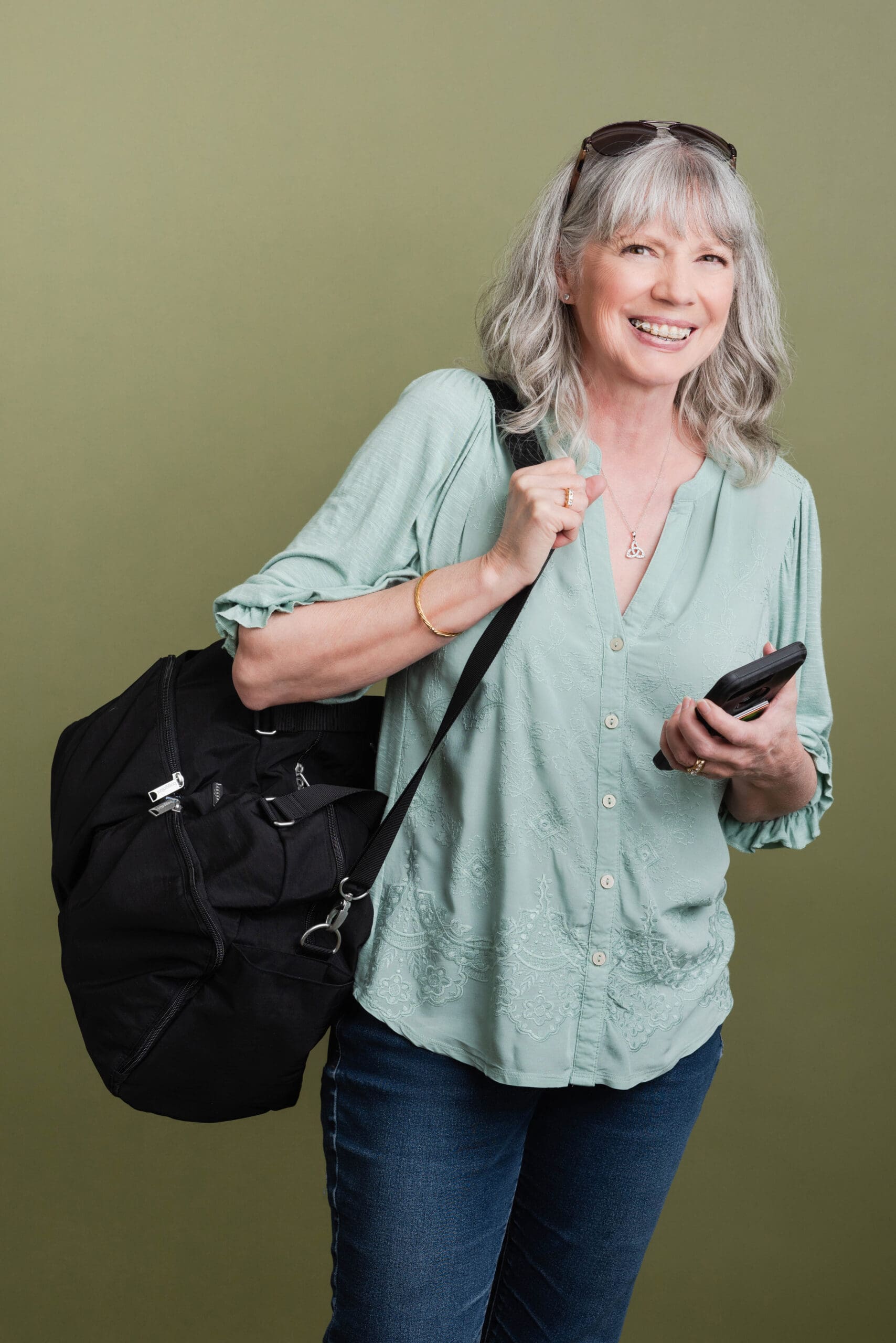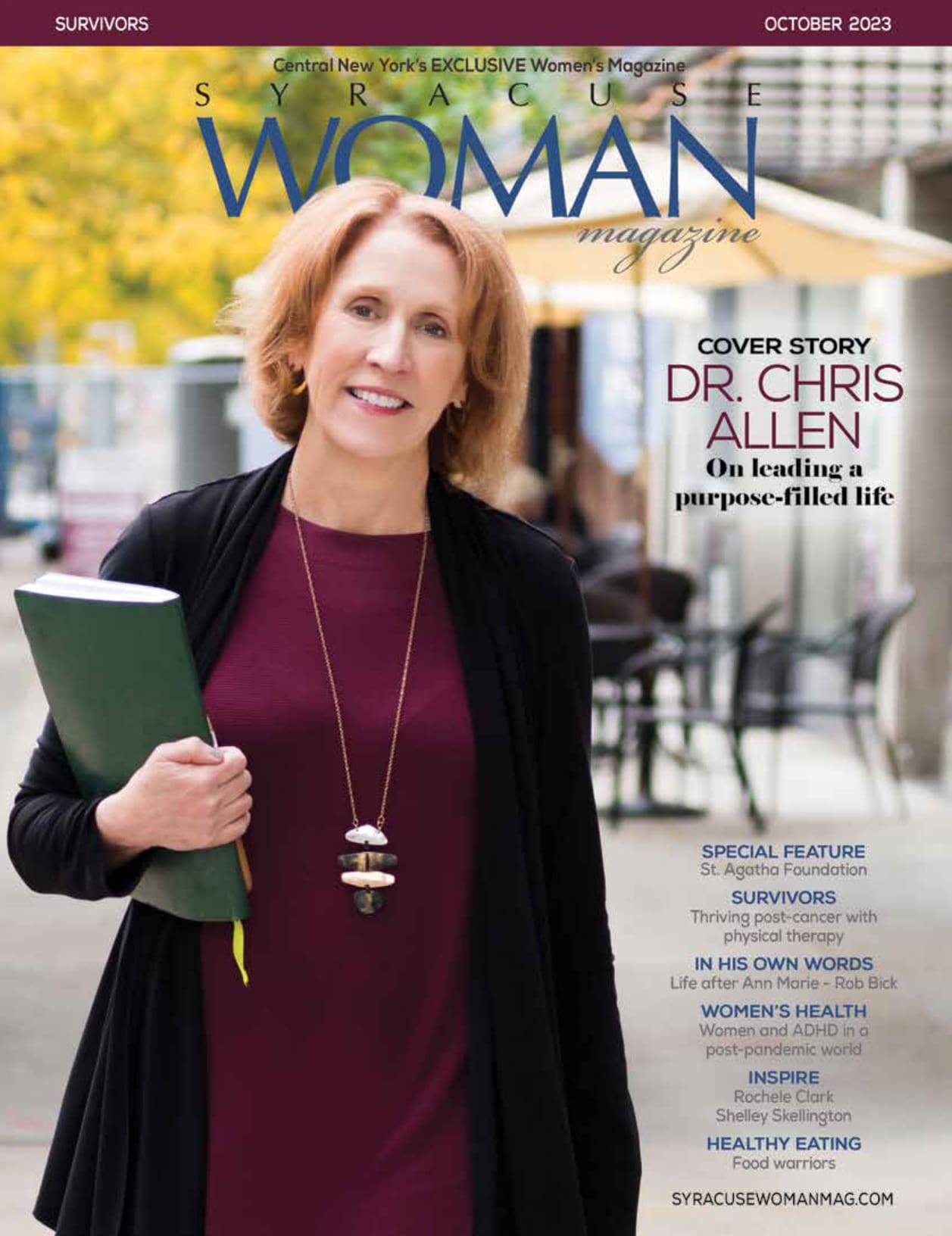By Norah Machia
When she was 13 years old, Ellen Somers volunteered to visit with the elderly residents of a nearby nursing home. As she spent time interacting with them, she began to observe varying degrees of memory loss, and that experience stayed with her long after she left home for college.
“I’ve always gravitated toward being around older adults,” says Somers, who built a lifelong career working with the elderly population. She holds a master’s degree in clinical psychology and a graduate certificate in gerontology and is a licensed mental health counselor.
For nearly 30 years, her primary areas of interest have been in cognitive health and dementia care, and she has used those years of experience to help address the many different needs of older adults, including improving their brain health.
Somers is the assistant director of the Syracuse Jewish Family Service, a nonprofit organization that serves older adults at Menorah Park in Dewitt, as well as those living in the community. Their services are available to anyone, regardless of faith.
Menorah Park has a continuum of care community on its campus, which includes independent living, assisted living, skilled nursing and short-term rehabilitation facilities, as well as a medical adult day program and a group home for developmentally disabled women. SJFS offers a variety of brain health programs for Menorah Park residents across the spectrum, from those with healthy cognition to moderate dementia.
The SJFS programs focus on helping individuals maintain their highest level of cognitive function to improve their quality of life. Several programs on the Menorah Park campus are open to the public, while the SJFS also provides home services in the community.
Some people experience memory loss or other cognitive changes as the result of normal age-related changes, but more serious memory loss, or changes in language ability, thinking or reasoning, are typically the result of underlying conditions, such as Alzheimer’s disease. Research findings have shown that “while certain disease processes can’t be reversed, there are ways to help people function at higher levels for as long as possible,” says Somers.

Her passion lies in working directly with older adults and their family members across a variety of settings. In 2015, Somers was hired by SJFS to develop new cognitive health programs at a time when the organization had identified a local gap in care for people in the early stages of dementia.
“SJFS decided to develop more services for the community with the backing of research that demonstrated the benefits of brain health programs,” Somers says. “That was the beginning of our M-Power U program, which we developed as a learning community for people experiencing early memory loss.”
Since then, SJFS has expanded its cognitive health group programs and supportive activities, including those that are educational and arts based. “We strongly believe in being responsive to the unique needs, interests, and strengths of participants,” Somers says.
The programs are designed to “help people with early memory loss stabilize their mood, feel good about themselves, and feel more confident in their ability to continue to learn and improve their daily activities,” she says.
While there is currently no cure for many diseases that affect brain function, including Alzheimer’s and Parkinson’s, “there are many avenues to helping people function better,” Somers says. “Hope plays a critical role in motivating and empowering people to make changes that help maintain or improve their quality of life and feel better about themselves.”
It may start with lifestyle changes that enable people with memory loss to function better in their environment. Family members can play a key role in helping set up those practical strategies, with professional guidance, says Somers.
For example, she spoke at length with the family of an elderly man to learn more about his past, including his career. Family members mentioned the man held a managerial role and always carried a small spiral notepad in his shirt pocket at work to write down ideas as they popped into his head.
But the man stopped carrying a small notebook in his shirt pocket after he retired. Somers suggested having him restart carrying a notebook in his pocket to write down his thoughts before he forgot them. That small change had a good chance of success because it was a habit that he had practiced for decades, so it was a familiar one, she says.
“You may have two older people with the same level of dementia, but just as with younger people, each person is different,” Somers says. “What works for one person may not work for the other. It’s important to tap into the unique strengths and familiar routines of individuals.”
It’s also critical to recognize the role mental health can play. “Just being anxious can impair your brain function,” she notes. “Your response to the disease may have a big impact on your memory loss.”
People of all ages benefit from developing skills or practices to help calm themselves, because “nobody functions well when they are anxious or depressed,” Somers adds. Practices such as relaxed breathing and mindfulness are very useful to overall brain health.
While it’s normal to have changes in memory as people age, mild cognitive impairment can be more difficult to detect. Medicare covers an annual memory screening which can help develop a baseline for memory loss, says Somers.
“Comparing yourself to yourself over time, rather than to others, is a more sensitive way” of determining potential cognitive decline, especially in the very early stages when the changes may be quite subtle, Somers says. Any observations made by family members and friends could be shared with healthcare providers as well. If it would be uncomfortable or impractical to discuss specific concerns in the presence of an older adult, a letter could be sent prior to an appointment, she adds.

Several factors contribute to improving cognitive health, including novelty, variety and challenge. The goal is to develop cognitive reserve, or the capacity of the brain to be resilient in the face of damage caused by various conditions, Somers explains.
This is achieved by strengthening and forming new connections between brain cells, through continuous new learning and application. The expression “use it or lose it” may be a popular cliché, but it is one backed by research, Somers says.
“When one pathway is damaged, alternative pathways can allow the brain to compensate and successfully perform certain functions, such as remembering things or finding the right word to express oneself,” she says. “It’s like having extra money in the bank that allows you to fix a leaky roof.”
While adopting a brain fitness program is no guarantee that a person will never experience memory loss, research has shown it may help delay it, and “keep you healthier for a longer time while functioning at a higher level,” Somers explains. “The earlier you adopt a brain-healthy lifestyle, the better, but it’s never too late to improve, even in your 80s and 90s.”
Adding challenges to your routine is another way to help the brain stay healthy. Improving brain health is no different than improving physical fitness, Somers explains. “If you start walking a mile, and it becomes easy for you, then you create a challenge by adding more miles, walking faster, or taking a different route with hills,” she explains.
Just as your body needs challenges to improve physical fitness, your brain needs to “sweat a bit” to stay healthy, Somers says. For example, many people do crossword puzzles to keep their brains sharp. “But if you get really good at it and find they come easy, you need to either find harder crossword puzzles or try a different type of cognitively challenging activity,” she explains.
To maximize both physical and brain health, it’s possible to add a cognitive challenge to physical activity. Starting a dance class or learning Tai Chi involves memorizing choreographed movements while participating in physical exercise.
Somers notes there are many basic ways to incorporate cognitive challenges into a daily routine. This may be as simple as trying to memorize a grocery list before going into a store, and then putting that piece of paper (or phone) away in a pocket. Trying to recall those items on the list when walking down the aisles is a brain-boosting activity for any age, she adds.
For more information: www.sjfs.org and www.menorahparkofcny.com






You must be logged in to post a comment.